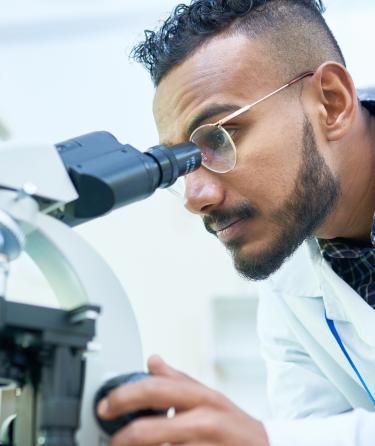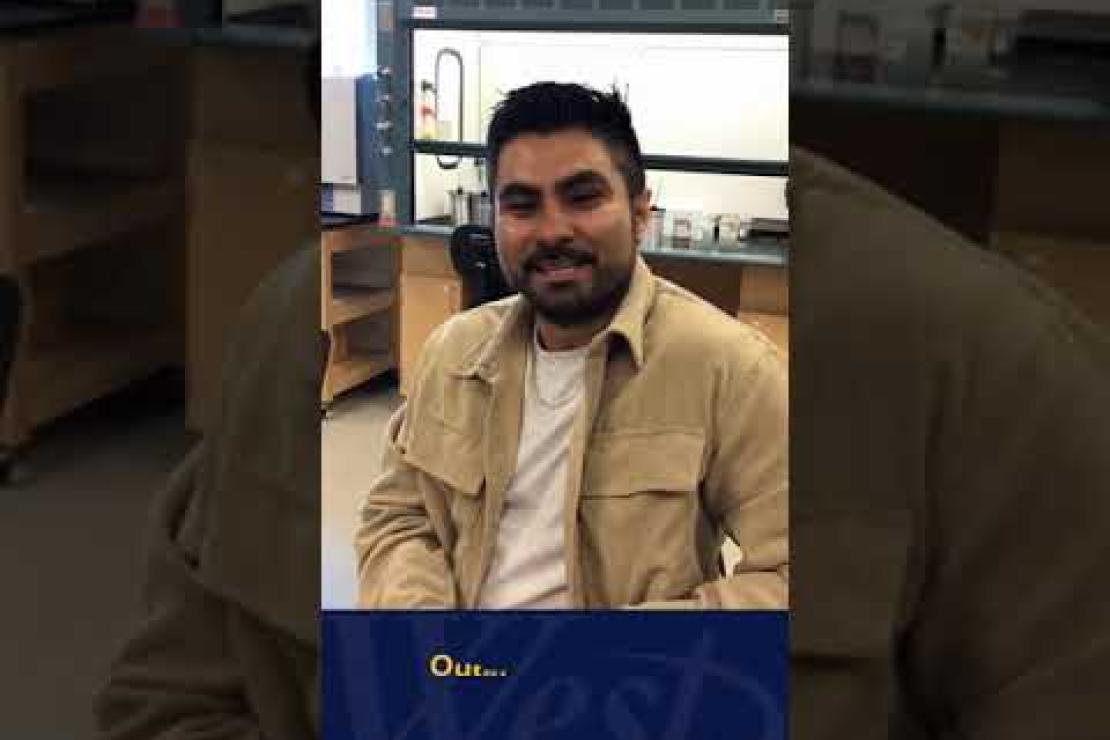Chemistry
Degrees Offered
Associate of Arts Degree in Chemistry (Major Code 1905.00)
Transfer students should consult the Counseling Office for major preparation and general education requirements of the particular transfer institution of their choice.
Transfer students who wish to also obtain an Associate Degree may do so by completing all WLAC general education requirements plus at least 18 units in the major as required by the transfer institution (a total of 60 units for an associate degree).
Associate of Arts (AA) Degree in Chemistry (45 Units, Plan B)
The Associate of Arts Degree in Chemistry will provide most lower-division requirements for the student planning to transfer to a four-year institution with a Chemistry major, while at the same time establishing a strong basic foundation in this science.
Students who wish to obtain an associate degree in Chemistry may do so by completing the course requirements listed below plus all other WLAC requirements for an associate degree.
REQUIRED COURSES
- CHEM 101 General Chemistry I (5 units)
- CHEM 102 General Chemistry II (5 units)
- CHEM 211 Organic Chemistry for Science Majors I (5 units)
- CHEM 212 Organic Chemistry for Science Majors II (5 units)
- MATH 261 Calculus 1 (5 units)
- MATH 262 Calculus II (5 units)
- MATH 263 Calculus III (5 units)
- PHYSICS 37 Physics for Engineers and Scientists I (5 units)
- PHYSICS 38 Physics for Engineers and Scientists II (5 units)
NOTE: Always review requirements of the institution to which you plan to transfer.
Course Descriptions
This course is a descriptive course in inorganic and organic chemistry. Topics include the metric system of measurement; chemical symbols, formulas and nomenclature systems; chemical equations; physical properties including density, solubility and states of matter; chemical properties; acids, bases, buffers and pH; basic principles of equilibrium and an introduction to radioactivity. Organic topics focus on functional group identification including hydrocarbons, organic halides, alcohols, ketones, acids, esters, amines, carbohydrates, lipids and proteins.
This course is designed for Nursing and other Allied Health majors, students in environmentally hazardous materials, elementary education or liberal arts who do not intend to take Chemistry 101.
TEXTBOOK: K. C. Timberlake, An Introductory to General, Organic, and Biological Chemistry, 11th Edition, Prentice Hall, 2012.
UC Transfer Credit Limit: A maximum of one course from Chemistry 51 or 60. No credit for Chemistry 51 or 60 if taken after Chemistry 101.
PREREQUISITE: Mathematics or one year of high school Algebra with a "C" or better
TRANSFER: UC/CSU
Student Learning Outcomes:
At the end of the semester the student will:
- Be familiar with fundamental concepts of chemistry and technical and abstract scientific ideas, which you can utilize to enlarge upon and enrich your own personal experiences
- Be able to apply appropriate mathematics in the solution of various chemical problems
This basic chemistry course presents elementary principles of general chemistry, including nomenclature and problem solving. Students whose previous chemistry background is inadequate for Chemistry 101 should take this course in preparation for Chemistry 101. Chemistry 60 is also recommended for students who have been away from high school chemistry for more than two years.
UC Transfer Credit Limit: A maximum of one course from Chemistry 51 or 60. No credit for Chemistry 51 or 60 if taken after Chemistry 101.
PREREQUISITE: Mathematics or one year of high school Algebra with a "C" or better
TRANSFER: UC/CSU
Student Learning Outcomes:
At the end of the semester the student will:
- Demonstrate understanding of atomic structure and Dalton's theory
- Show understanding of how to name inorganic compounds and write chemical formulas
This course covers the organic and biochemical principles found in physiology and metabolic processes. Topics include organic and biochemistry with emphasis on the role of chemistry in health and disease, as well as molecular diseases and metabolic abnormalities.
PREREQUISITE: Chemistry 51 with a "C" or better; Mathematics 125 or Mathematics 123C or one year of high school Algebra with a "C" or better
TRANSFER: UC/CSU
This is a basic course emphasizing principles and theories. It includes discussions of chemical stoichiometry, atomic and molecular structure and the periodic table, gases, liquids, solids, solutions, oxidation reduction, acids and bases, and an introduction to chemical thermodynamics. The laboratory emphasizes basic laboratory skills, chemical principles, and quantitative relationships.
UC Transfer Credit Limit: No credit for Chemistry 51 or 60 if taken after Chemistry 101
PREREQUISITE: Chemistry 60 or high school chemistry with a "C" or better; Mathematics 125 (or equivalent) or a minimum of two years of high school mathematics with a "C" or better
TRANSFER: UC/CSU
Student Learning Outcomes:
At the end of the semester the student will:
Quantitatively formulate the characteristics of a chemical reaction.
This course is a continuation of Chemistry 101, with an introduction to chemical kinetics, chemical equilibrium with emphasis on aqueous equilibria, electrochemistry, nuclear chemistry, organic chemistry, and descriptive inorganic chemistry. The laboratory includes both quantitative experiments and qualitative analysis. Note: No UC credit for Chemistry 51 or 60 if taken after Chemistry 101.
PREREQUISITE: Chemistry 101 with a grade of "C" or better
TRANSFER: UC/CSU
Student Learning Outcomes:
At the end of the semester the student will:
- Conceptually understand the existence of an infinite set of concentrations of products and reactants that satisfy an equilibrium expression, for all types of equilibrium systems that tie-in with chemical kinetics, thermodynamics and electrochemistry
- Understand the thermodynamic properties of chemical reactions in terms of change in Gibb's Free Energy and relate the signs (+/-) of delta H, delta S and delta G to the spontaneity of a chemical process at different temperatures
The student is introduced to structure, bonding, naming, stereochemistry and functional group chemistry with emphasis on reactions and reaction mechanisms. In the laboratory, the essential skills of preparation, isolation, purification and identification of organic compounds are presented.
PREREQUISITE: Chemistry 102 with a grade of "C" or better
TRANSFER: UC/CSU
Student Learning Outcomes:
At the end of the semester the student will:
- Understand the mechanism and product of a radical reaction in organic compounds.
- Understand and apply H-NMR data analysis.
Chemistry 212 is a continuation of Chemistry 211 with additional emphasis on the remaining functional groups as well as on multi- step synthesis and reaction mechanisms in stereochemistry and modern instrumental and analytical methods. Special attention is given to reactions and organic compounds of biochemical importance. Significant laboratory time is devoted to synthesis of complex organic compounds.
PREREQUISITE: Chemistry 211 with a grade of "C" or better
TRANSFER: UC/CSU
Student Learning Outcomes:
At the end of the semester the student will:
- Predict reaction products and the role of reagents in organic reactions.
- Apply reaction mechanism to explain some basic organic reactions.
This course will provide a detailed introduction to the principles, concepts and terminology of biochemistry, with an emphasis on the structure and function of biological molecules, the role of metabolism in energy production and common biochemical laboratory techniques. Topics include the fundamental structures, chemistry, and properties of four groups of biological macromolecules (carbohydrates, lipids, proteins and nucleic acids) and their building blocks. This course will also present protein structure and function, enzyme catalysis, and the details of the central metabolic pathways (glycolysis, glycogenosis, the citric acid cycle, electron transport, and oxidative phosphorylation) including their regulation and integration. Throughout the course the organizing principles of biochemistry and the distinctive characteristics of the living state will be emphasized. The laboratory exposes the students to a variety of biochemical techniques and how they are used to evaluate biomolecules and systems. These techniques include electrophoresis, spectroscopic analysis, spectrophotometry, fractional distillation, various types of chromatography including paper, thin layer, and molecular exclusion and enzyme assays. This course prepares students for careers in physical and biological sciences, pharmacy, medical and dental professions, veterinary and agricultural sciences, nutrition and food chemistry, and related fields.
PREREQUISITE: Chemistry 211 with a grade of "C" or better
TRANSFER: UC/CSU
Student Learning Outcomes:
At the end of the semester the student will:
- Describe and evaluate the composition, structure, properties and functions of the major groups of biomolecules including proteins, carbohydrates, lipids, (and to a lesser extent nucleic acids) and their chemical building blocks.
- Describe and evaluate the characteristics of biological catalysts (enzymes) and their role in facilitating and regulating the reactions needed to accommodate the living state.

